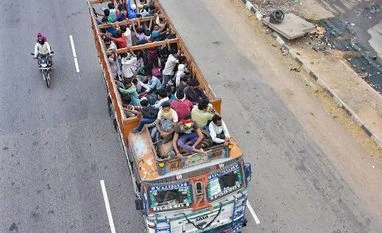Leading economists and activists of the country have come together to propose a seven-point plan of action to deal with the economic and humanitarian crisis brought about due to Covid-19.
Calling the action plan ‘Mission Jai Hind’, the experts on Friday recommended that the government provide free health care for all Covid-19 patients, along with a three-month interest waiver on loans taken by farmers, small business and homebuyers, apart from enhancing job guarantees.
Economists behind the 7-point charter include former Planning Commission member Abhijit Sen, Former Chief Economic Advisor Deepak Nayyar, R Nagaraj, from the Indira Gandhi Insititute of Development Research, Prof Pranab Bardhan, and Jean Drèze, among others.
Social activists Rajmohan Gandhi, Ramachandra Guha, Ganesh Devy, EAS Sarma, Harsh Mander, Nikhil De, Admiral Ramdas, Lalita Ramdas, and Yogendra Yadav, among many others, also endorsed the plan.
To raise resources for these initiatives, the action plan asked the government to do “whatever it takes”. “All the resources (cash, real estate, property, bonds, etc) with citizens or within the nation must be treated as national resources during this crisis,” the economists said.
First, they said, all migrants should be sent back to their native places in 10 days free of charge. They recommended universal access be given to all those who don’t have ration cards to not just grains but expand it to include 10 kg foodgrain, 1.5 kg daal, 800 ml cooking oil, 500 gm sugar per person per month for six months. They suggested ration equivalent of mid-day-meal to be delivered at home, and community kitchens to be run in schools until the universal ration is activated.
The plan of action recommended three sets of measures for revival of economy. One, in rural areas, MGNREGA should be expanded to 200 days per household, besides compensating workers for job loss and clearing pending wages. It also proposed an urban employment guarantee for 100 days per person for this year.
Two, they recommended the government to compensate for loss of job, salary, or livelihood. “This could take multiple forms: job loss allowance for the salaried, wage subsidies for firms, crop loss compensation for farmers, and one-time support of around Rs 10,000 to hawkers, vendors, small shopkeepers to restart their business along with an ex-gratia of Rs 2,000 per month for three months to all social security pension beneficiaries including disabled, widows, old persons, etc.”
Three, they recommended there should be no interest charged to weaker sections till the economy revives.
Expenses under this mission should be the first charge on the exchequer, everything else follows, they said, adding: “There should be a complete ban on all wasteful and non-essential public expenditure and subsidies.”
Update: Yogendra Yadav, president of Swaraj India and one of the signatories to the statement, on May 23 clarified that the suggestion to treat all private assets as national resources had been wrongly interpreted as nationalisation of private property. That, he said, was far from the intended import of the recommendation. The government should explore emergency measures to raise resources beyond the usual taxes and levies to cope with the problem of funding large relief packages, he said.
The original recommendation: Click on the image to see full statement
Unlock 30+ premium stories daily hand-picked by our editors, across devices on browser and app.
Pick your 5 favourite companies, get a daily email with all news updates on them.
Full access to our intuitive epaper - clip, save, share articles from any device; newspaper archives from 2006.
Preferential invites to Business Standard events.
Curated newsletters on markets, personal finance, policy & politics, start-ups, technology, and more.
)